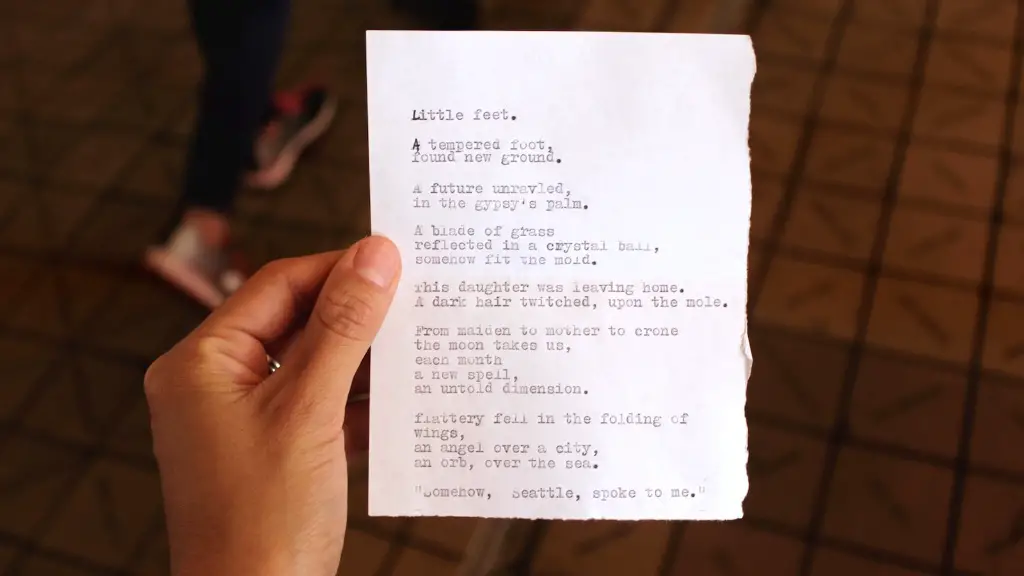Walt Whitman and His Contradictory Nature
Walt Whitman is widely regarded as one of the greatest American poets of the nineteenth century, having written some of the greatest works of literature that the United States has ever produced. He is also well-known for his baffling and often contradictory statements, making him one of the most unique and controversial figures in American literature. Many of his poems contain conflicting elements and multiple layers of meanings, often leaving readers guessing as to what the true intended message is. This contradictory nature of Walt Whitman is seen in many aspects of his life, from his career to his personal life. To really understand Walt Whitman and his unique and contradictory nature, it is important to take a look at the poet’s life and his works.
Walt Whitman first came to prominence by publishing “Leaves of Grass” in 1855, a groundbreaking work that challenged long-held conceptions of what poetry could be and what it should express. It is this work that is considered to be his magnum opus, and it still captures the imagination of readers today, even more than a century after its initial publication. The poem chronicles Whitman’s journey across the United States, painting vivid pictures of the people and places he encountered along the way. It is filled with emotions that range from joy and wonder to woe and despair, and the language used is often poetic and lyrical.
While the poem is lauded for its beauty and sheer emotion, it is also known for its stark contrast between its subject and the style of its language. Whitman frequently contradicted himself in his works, as he described both the grandeur and beauty of nature as well as its destruction and ugliness. This tendency to create tension by contrasting elements of his poetry is seen in many of his poems, and is often seen as a reflection of his own inner struggles. This inner struggle, of course, is seen in other aspects of Whitman’s life. He was a fierce opponent of slavery even though he had grown up in a slave-holding society, and he advocated for the rights of women and labor even though he never saw himself as a feminist.
It is also interesting to note that this contradiction was not limited to his philosophical beliefs. Whitman was a passionate supporter of the Union during the Civil War and was an outspoken critic of the Confederacy. Yet, he also had a softer, more sensitive side, and celebrated the beauty of nature in his poetry. This duality within his character is seen in his poetry as well, as he often wrote of both the beauty and destruction of life in the same poem. His poetic style is often seen to blur the lines between reality and imagination, between the physical and psychological world.
Walt Whitman’s contradictory nature is further displayed in his personal life. He was a lover of nature, but he also led a life of urbanity. He was an advocate of the common man yet he was also an elitist. He advocated for individuality yet was also a proponent of collective action. He was a champion of freedom yet was also a passionate supporter of the Union. It is this complexity of character that makes Whitman such an intriguing figure in American literary history.
In conclusion, Walt Whitman’s contradictory nature is what made him such an influential figure in American literature. He wrote of love and war, of beauty and destruction, of life and death, often combining seemingly opposite elements in the same poem. He was a champion of the common man yet also a lover of luxury. He was a fierce advocate of individualism yet also a supporter of collective action. He was a passionate critic of slavery yet had to reconcile his own upbringing in a slave-owning society. Such a complex figure desrves to be remembered and discussed.
Other Aspects of Walt Whitman’s Contradictory Nature
In addition to the complexities of his own inner life and his poetry, Walt Whitman was also an unflinchingly honest writer. He was unafraid to express his opinion, and his works often challenged the status quo or confronted society’s prevailing beliefs. This contrasted sharply with his life as a poet and public figure. Publicly, Whitman was a tireless promoter of peace, of moderation, and of understanding, yet in his works he expressed a passionate, often angry, and very honest critique of the culture in which he lived.
This dual nature was also seen in the way in which Whitman expressed his opinions. In his public appearances, speeches, and interviews, Whitman presented himself as a calm and collected figure, often speaking in broad, sweeping generalizations. Yet, when his works were examined more closely, it was clear that he also expressed a much more controversial opinion in much more concrete terms. This combination made him an interesting person to study and to understand.
This same duality can be seen in Whitman’s relationship to religion. On one hand, he was a Christian and even wrote about the need for religious tolerance in some of his works. On the other hand, he was also a spiritual seeker and had a very eclectic spiritual practice that combined elements from Eastern and Western religions. His works often expressed a great admiration for nature, and some have argued that his spiritual practice was a form of pantheism.
It is this contradictory nature of Whitman’s which makes him such a fascinating figure. He was able to be both practical and philosophical, both intellectual and spiritual, both individualistic and collective. He expressed both strong opinions and contradictory views and was unafraid to challenge the status quo. His works, his life, and his spiritual practice all spoke to the vastness of his creative output and to his willingness to explore a variety of views and perspectives.
Walt Whitman and His Interpretations
As a poet, Walt Whitman left a lasting impression on readers, not just by the words he wrote, but also by the way they are interpreted. Every reader will take something different away from Whitman’s works, as his poems and prose invite readers to explore the depths of their own souls. While Whitman had a knack for expressing his own emotions and thoughts in an honest and raw way, he also wrote with an eye for the reader and the way in which his works could be interpreted. He often wrote in a way that provided the reader with an opportunity to apply the words to their own experiences, to come away from the poem or essay with a greater understanding of themselves or of the world around them.
People who read Whitman’s work often come away with different interpretations, which is testament to the poet’s immense talent. He wrote words that were open to interpretation, giving the reader room to explore their own feelings and ideas. He also wrote with an eye for the changing needs of readers, offering up timeless wisdom housed in language that was constantly evolving and searching.
This ability to provide multiple interpretations of his works is one of the most fascinating aspects of Whitman’s poetry. He wrote poems and prose that could be interpreted in different ways, depending on the reader’s perspective and experiences. This allows readers to draw their own conclusions and to glean insight and wisdom from his work without being told what to think. He was able to provide the reader with the tools for self-exploration, ultimately leading them to a deeper understanding of their own lives.
Beyond his own works, Whitman also had a major influence on other writers and poets, both during his lifetime and in the decades and centuries since his death. Even today, writers and poets continue to draw inspiration and guidance from Whitman’s works, as his writing style and ideas remain timeless. He was able to be both contemporary and progressive, which has allowed him to remain as relevant today as he was in the nineteenth century.
Legacy of Walt Whitman’s Contradictory Nature
As one of the most influential writers in the history of American letters, Walt Whitman has left an indelible mark on the world of literature. His works have been read and studied by countless people, and his words have inspired generations of writers, poets, and thinkers. His impact on the world of literature is far-reaching, and his influence on modern culture is undeniable.
Beyond his influence in literature, Whitman’s contradictory nature has also served as a valuable example of how people can be both simultaneously progressive, passionate, and personal. His works are filled with emotion and fervor, yet he was never one to shy away from expressing himself honestly or from challenging the status quo. His works encourage readers to explore their own thoughts and feelings, and to think critically about the world around them.
For those who are interested in understanding Walt Whitman and his many contradictory statements, it is important to study both his life story and his works. His life story provides a unique and nuanced look at the man behind the words, while his works provide his own unique insights into the world around him. By understanding both his life and his works, one can truly appreciate the duality of this great American writer, and see how his contradictory nature is still relevant even today.
Living and Emulating Walt Whitman’s Contradiction
Walt Whitman was a complex and contradictory character, and living up to his example and his tradition of honest and open expression is no easy task. But by studying his life and reading his works, it is possible to gain insight into Whitman’s life and his thought process, and see how his contradictory nature can be applied in our own lives.
Drawing on the example of Whitman, we can strive to be both honest and open while still holding conflicting opinions. We must learn to be tolerant and accepting of opposing viewpoints, and to be willing to challenge our own ideas and beliefs when necessary. We must also strive to find a balance between our own individual pursuits and our collective effort to improve the world we live in. By embracing our contradictions and striving to stay true to ourselves, we can learn to live a life more in line with Walt Whitman’s example.
By understanding Whitman’s contradictory nature, we can also gain a deeper appreciation for his work. While his works may seem confusing and convoluted at first, when we understand his life better, it is much easier to appreciate and comprehend the nuances of his poetry and prose. By learning from his example, we can strive to be more like Walt Whitman, learning to embrace our own contradictions and to express ourselves in an honest and true way.
Influence of Walt Whitman’s Contradictory Nature Today
The legacy of Walt Whitman’s contradictory nature lives on today. His works are still widely read and studied, and his influence on American literature can be found in countless works written by modern authors. Perhaps more importantly, Whitman’s willingness to express his true feelings and opinions, even in the face of public disapproval, is an example to us all. It is a reminder that no matter how contradictory our views may be, we can still be honest and open in our expression of those views.
When it comes to our personal lives, Whitman’s example encourages us to be honest and open with ourselves and with those around us. We should strive to embrace our contradictions and to be willing to challenge our own beliefs and preconceived notions. More importantly, we should strive to express ourselves in a way that is honest and vulnerable, even when that expression may be unpopular or controversial.
By understanding the life and works of Walt Whitman, it is possible to gain insight into what made him the great American poet that he was, and to appreciate his works on a deeper level. From his example, we can learn the importance of expressing ourselves honestly, of accepting our own contradictions, and of living out our lives with an open mind and a willingness to challenge the status quo.





